When we talk about JRPGs and video games, it is simply impossible for the name Final Fantasy to not be mentioned. With a long history of 35 years since the launch of its first title and with a dozen games released on the most varied platforms, the franchise has already presented its fans and new players with some of the most fascinating plots and most elaborate worlds in gaming history.
When we enter this universe, it is almost inevitable not to be impressed by the most varied characters and their journey through the story, and often learn something from them.
You see, in recent years — perhaps due to the torrent of information we receive from everywhere, or because we have grown up to have a broader perception of the world around us — we haven't been living the best moments in history. We live in a reality of uncertainty, bombarded by bad news all the time, often leading us to question - in the face of a world of conflicts alien to our existence - if there is any purpose to our life, or if we are just victims of chance, powerless over our fate and perpetually caught in a string of small misfortunes.
With so much going on every day, there are times when we feel overwhelmed by the surrounding reality, and sometimes we just need to stop, take a moment for ourselves and enjoy some time away from the rest of the world, even traveling to another in works of fiction like books, movies, a television series, and of course, video games.
Therefore, I would like to invite you to know a bit more about what, although not specifically my favorite, is considered by many (including me) as the best title in the franchise — Final Fantasy IX.
A Journey into Life's meaning
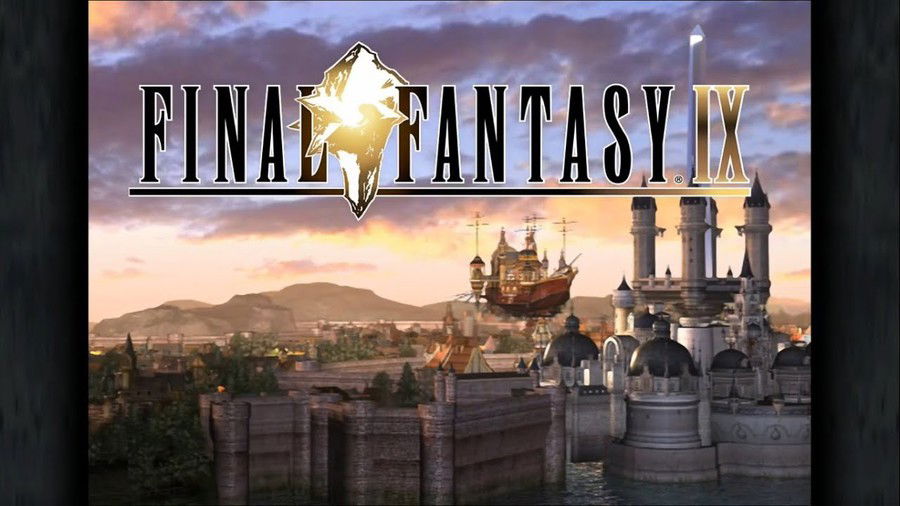
For those unfamiliar, Final Fantasy IX was released by Squaresoft (Square Enix currently) in July 2000 for PlayStation 1 and has since been re-released on multiple platforms and is currently available for PC, iOS, Android, Nintendo Switch, PlayStation 4 and Xbox One and I highly recommend it to anyone who has never had direct contact with the franchise before, as it is the title that brings – according to the series creator himself – the true meaning of what Final Fantasy is.
Its plot revolves around the war of Alexandria against the other three great nations of the gigantic Mist Continent, through the eyes of a small group of eight characters from the most diverse regions of the world led by the charismatic Zidane Tribal, member of a group of bandits known as the Tantalus, hired by Regent Cid of Lindblum to kidnap Princess Garnet Til Alexandros, who conveniently wants to flee Alexandria.
After the kidnapping goes awry, Zidane temporarily separates from Tantalus and, accompanied by the stubborn captain Adalbert Steiner and the introspective and gentle black mage, Vivi Ornitier, heads deep into the Evil Forest, where they rescue Garnet and begin their journey to Lindblum, as Brahne sends minions to capture her, and the plot expands when Alexandria attacks the kingdom of Burmecia, and the party discovers the existence of a mysterious weapons dealer behind the queen's actions, Kuja.
I think many people at this point must be asking themselves, "why should I spend my time with a game released that is over 20 years old and with dated mechanics?"
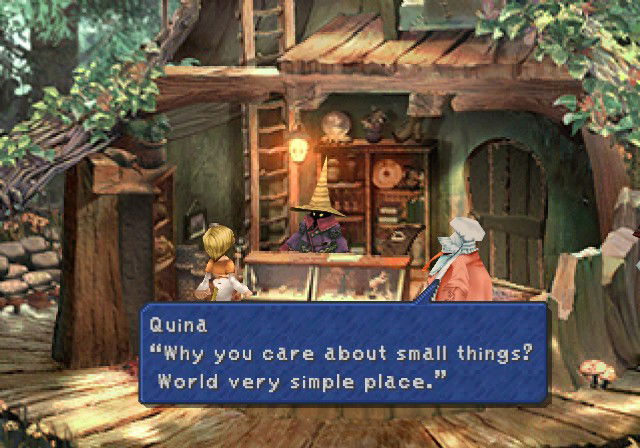
There are several reasons, but let's break it down to the most important:
The first thing I recommend asking yourself is if you like a good story, and if you usually reflect on the situations, choices and dilemmas of the characters that are presented to as you watch and interact with the plot's unfolding. If so, I truly believe that Final Fantasy IX is undoubtedly what you are looking for.
It's not that the game isn't fun, it is — and a lot, if you're into RPGs and strategy — but what makes this title so important is how much it reflects on our mortality, having a purpose in life, or whatever it means to be alive. It delivers a powerful yet simple-to-understand narrative about being at peace with our ephemeral time in this world and what we can do while we're here.
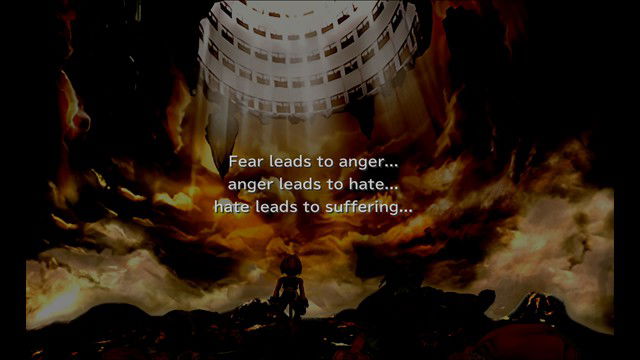
In an age where we are constantly pressured by the reality's misfortunes and under the usual stress of dealing with the worst of what humanity has to offer, it is natural to often question ourselves if there is any purpose to our lives, or if we are just wandering in an endless sea of chaos and suffering — and Final Fantasy IX seeks to answer that question in its own way:
It doesn't matter if your life has a purpose. Life isn't about who you should be, it's about what you do and the moments you share with others, the foods you try, the feelings you cultivate, the places you visit, the experiences you have, and how you and everyone around has the potential to make great accomplishments to build a better future.Even in a world wrapped in collective tragedies and often predetermined by our circumstances, we are also individual creatures and no one will be able to see, feel, laugh, tell, love and learn like us. And it is through our experiences that we can teach the next generations in the ephemeral time of our existence, that we can overcome our fears and conflicts, leaving our legacy on this planet.
From its first hour to the final boss sequence — which I particularly interpret as a metaphorical confrontation against the depression and existential dread that inhabits all of us — the characters are faced with finding their place in the world and, through their own self-discovery journeys, find their own interpretation of purpose.
Final Fantasy IX, at the end of the day, is a story about coming to terms with your own mortality and through self-improvement, finding your place in the world or, as the first song you hear when starting the game indicates, A Place to Call Home.
Its story doesn't seek to tell the player "this is the right way to live", but replace this with "eventually you'll find your way to appreciate the good times that can only exist if you're alive" - a notoriously powerful message at a time when so many people are dealing with serious mental health issues.
With a plot that seeks to expose and demonstrate that the things we experience and the circumstances of our realities define help to predetermine how we develop as individuals, the title encompasses our duty to find our own way of living while we are here, build the memories and teachings that will be passed on to future generations and, with some hope, create a better world for us and for those who approach us, thus leaving our legacy in History.
What's in Final Fantasy IX?
In technical terms, Final Fantasy IX brings absolutely nothing new to the franchise compared to its predecessors or some successors: it is a classic title that uses the turn-based ATB system to unfold its battles, where you select a command for the characters, and they perform. In that sense, it is totally distinct from a more recent title in the franchise like Final Fantasy XV and closer to other games like Persona 5 or Yakuza: Like a Dragon.
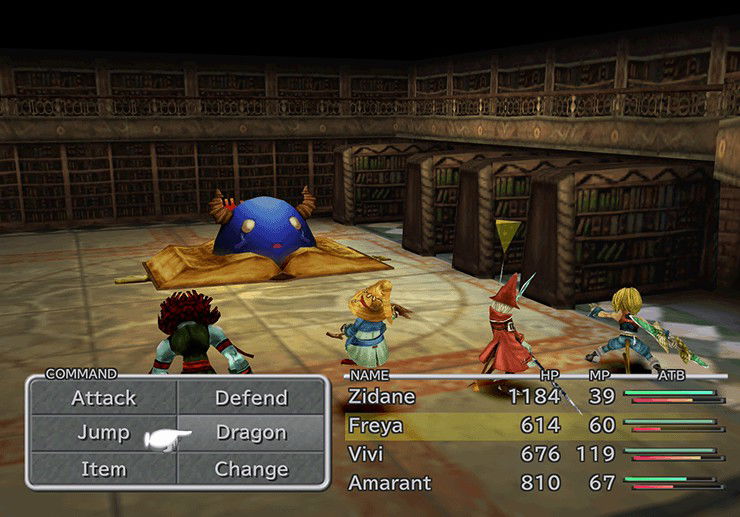
The absence of real-time action makes it much more strategy-based than combat-specific. Of course, most common enemies (that you encounter in random battles while walking through a dungeon or on the world map) are easy to defeat with a few attacks, or using a higher level spell, but boss battles usually demand extra attention on their attack patterns and how to prevent your characters from being easy targets, as there is no conventional means to become superpowered in this title until the very advanced stages of the story, unless you spend too much time grinding - of which this title doesn't require you to do.
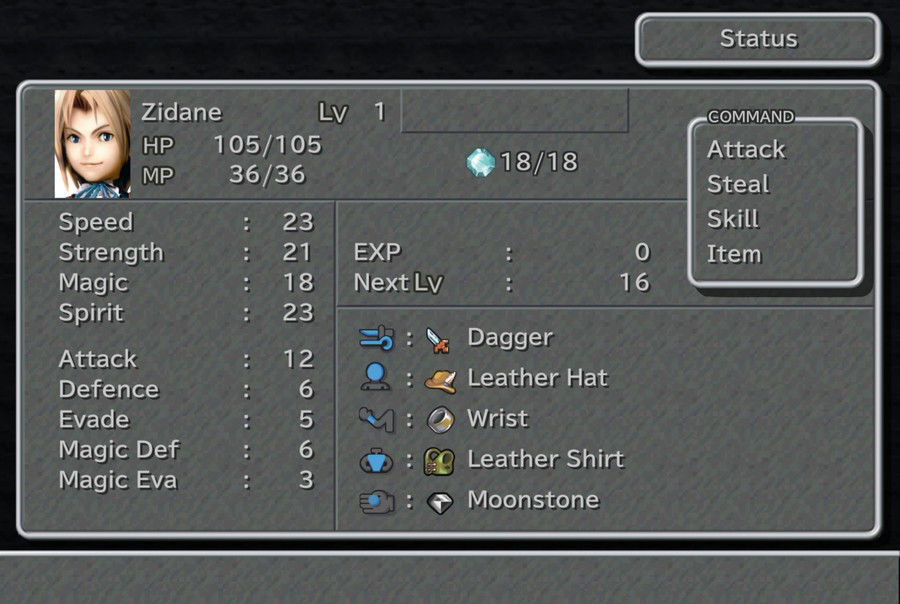
For this, the game has a classic equipment system that includes weapons, hats, armor, gloves and accessories — all offering some bonus to character stats, but also the ability to learn new skills, ranging from new spells and Summons to passive abilities that protect a character from negative effects, or increase their HP, give some automatic buffs at the start of battle, etc.
In addition, the armors themselves may also have properties that increase the damage to a certain elemental type, or reduce another, etc. — each of these points adds an extra layer of planning and analysis to equip the right items and gain the skills needed for that dungeon, or to mitigate the damage done by a boss.
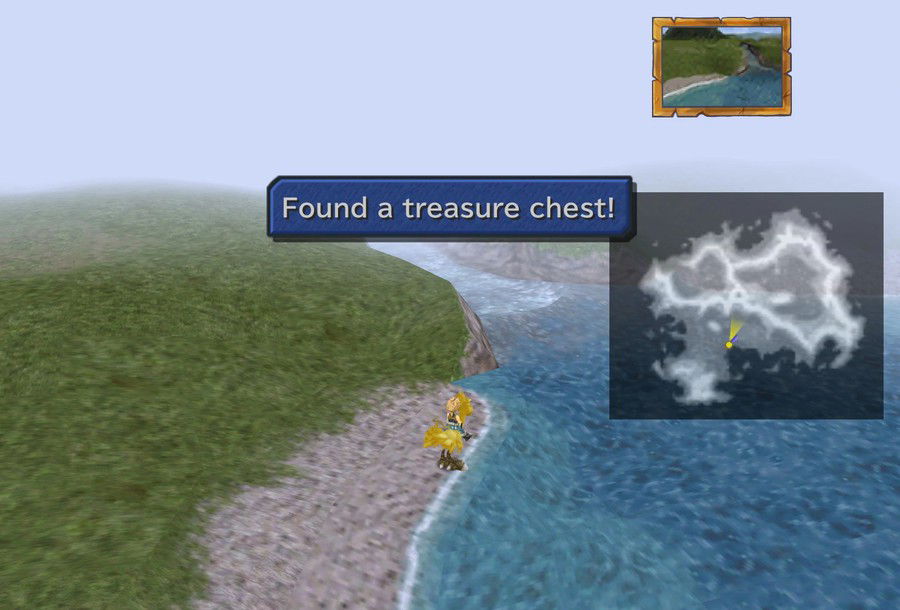
The world of Final Fantasy IX greatly rewards exploration: character dialogues teach you a lot about the world you're visiting, every corner of a setting has some treasure for you to discover, and there's a plethora of extra content to do: Chocobos, treasure hunt, a collectible card game, secret bosses to defeat, friendly monsters, catching frogs, among others that make the experience very fruitful when you reach the later stages, in addition to rewarding you with awesome items and — depending on the quest — some of the best weapons in the game.
As you can see, mechanically speaking, FFIX doesn't do anything new that its predecessors and some of its successors haven't done before, but it brings together numerous different elements in the most efficient way possible, making it a robust, enjoyable experience that in no time makes you feel annoyed or stressed about something of which "could've been better".
About the Game
An incredibly beautiful world, shrouded in tragedy
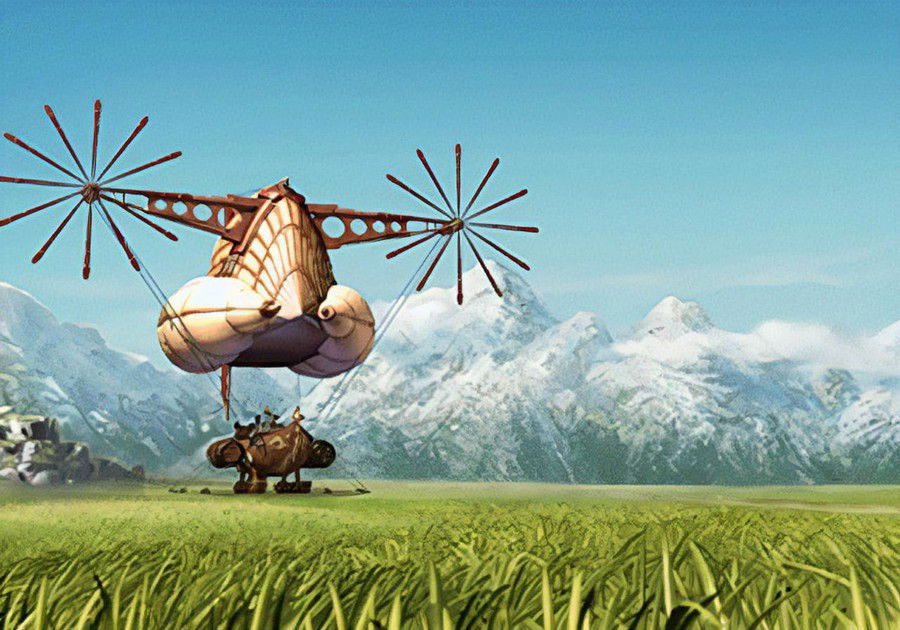
If it was all too easy to mistake Final Fantasy IX for a childish game in the 2000s, it's even easier today: the world of Gaia is shrouded in magic and colored with vivid palettes. In it, there are all kinds of humanoid creatures, and many of them have completely unreal proportions, like big heads and small bodies, or NPCs with giant noses, or red wizards that look more like cowboys, cutscenes with exaggerated facial expressions, etc.
And the game doesn't seem to collaborate, let alone want to deconstruct this image: the first hour of its journey easily confirms that the universe of this title is all about fantasy, and even the characters' behavior comes to be stereotyped and predictable in these moments: a heroic thief who decides to save the princess from a monster in the forest, the stubborn knight who wants to return with her to the castle, a shy young wizard who lacks self-confidence, an evil queen who intends to take the princess back at any cost... almost a classic Disney tale.
However, it is when you are about to arrive in Lindblum, approximately at the second hour of the journey, where Vivi sees other mages being exterminated by the last of the Black Waltz, that you realize that this story is not a mere childish fantasy, but a journey into a world surrounded by the uncertainty of war — and we are reminded of this a few minutes later, when the Festival of the Hunt's festivities are interrupted by the arrival of a Burmecian soldier in Lindblum, to warn of Alexandria's attack on his kingdom, dying shortly thereafter.
From that moment on, Final Fantasy IX stops bringing just a fantasy world, and started to add a layer of tragedy at every hour, directly or indirectly affecting the characters that guide us during the plot and reminding us that to live is, inevitably, to suffer.
If we look at the macro of the situation, all four great nations of the Mist Continent face severe consequences during the story. Just think how much the people of each of these kingdoms suffered and lost, how much they fear the continuation of the war, and how violently they dealt with each other in times of crisis.
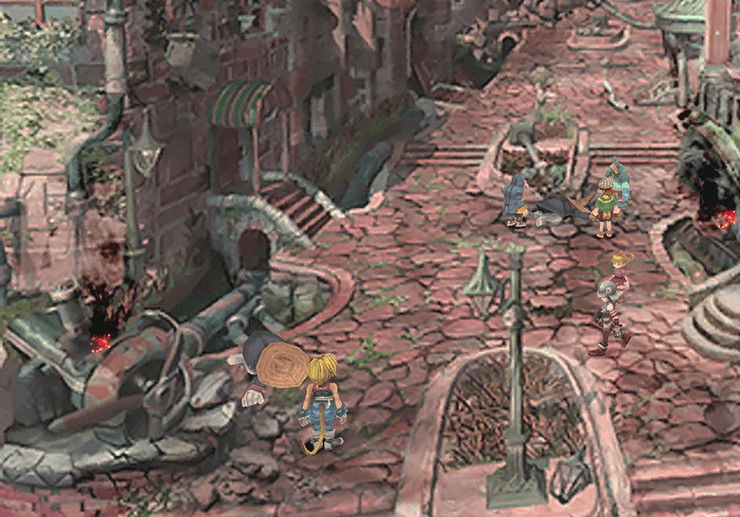
You can often see this when talking to NPCs, or through Mognet's letters, but one scene that sticks in my head is when Zidane and Garnet arrive at the newly destroyed Lindblum, and in the Commercial District, three workers corner a fallen Black Mage and debate whether to kill it by crushing its head or chest, and Zidane intervenes reminding them that creature is also a living being, which the workers disregard saying they only look human, but killed people without hesitation.
In their place, we couldn't blame them for creating a dehumanization in the face of the irreparable loss of family and friends — the entire cutscene of Alexandria's attack on Lindblum is heartbreaking as Atomos is summoned, and we see lives on both sides being decimated without any consideration or compassion coming from Queen Brahne who, by this point, was already totally corrupted by her greed.
The fascinating detailing of how people are living and behaving in Final Fantasy IX is one of the best elements of the game because it helps create an even more immersive experience, giving us an understanding of the world we are exploring and of the people they are meeting. This is an element that Square, unfortunately, ends up lacking in some of its titles.
Amidst the chaos, Empathy
However, in the midst of chaos, the game also presents other unique characteristics and collective sense in times of crisis: the resilience of not giving up even when your home is in danger, or the world on the brink of destruction, coming together to rebuild their homes, etc.
There are frequent moments where we see the secondary characters really care about each other, or about the main characters with dialogues that can go unnoticed when you just want more action, but they help to demonstrate their relationships and show their coexistence is incredibly genuine. If one character helps another, it's usually because they care — and while that's often just to move the plot, there are only a few moments where the narrative fails to make it feel natural.
To deepen the immersion even further and demonstrate that each character has their own dilemma and issues to resolve, Final Fantasy IX introduces the Active Time Event, or ATE — a sequence of optional cutscenes that you can watch with the press of a single button when they appear., usually signaled by a sound and an on-screen message, where the player can witness events occurring in parallel with their actions. For example, if you're stocking up on your Potions and buying new equipments, some other character might be walking around, talking to the villagers, or eating something for free, or even telling someone to Rally-Ho themselves.
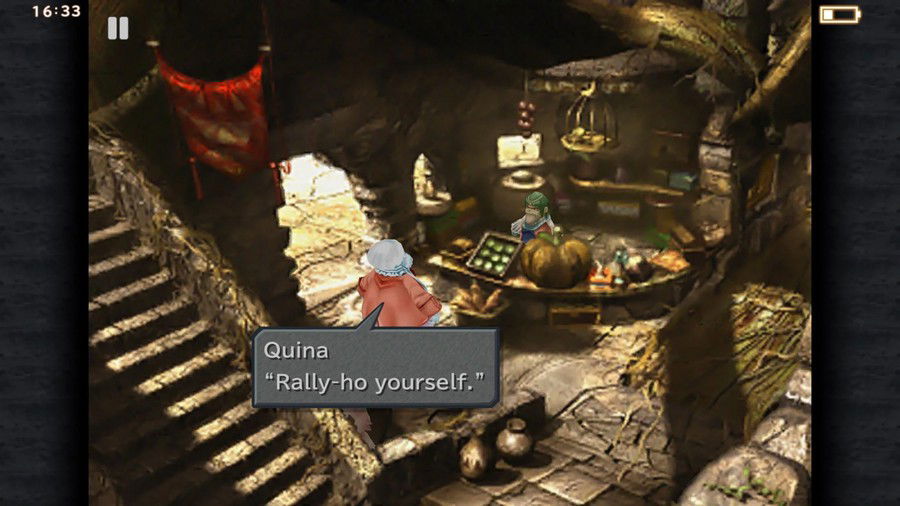
Watching these scenes makes the protagonists and NPCs feel more vivid and relevant to the plot.
Speaking of which, Final Fantasy IX has...
The best main characters in the franchise
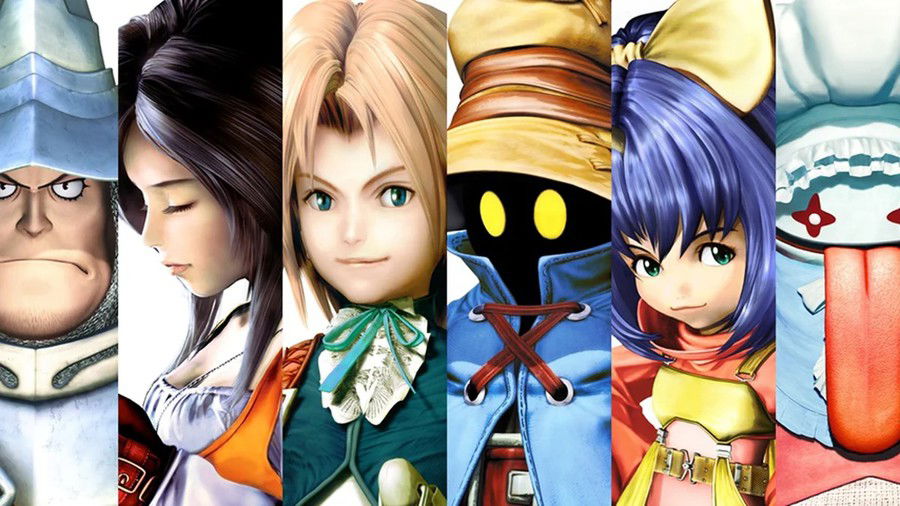
I know, this is a title open to an endless debate, but no game in the franchise to date has managed to develop and deepen its characters as well as Final Fantasy IX did.
Many people, when we talk about development and story, mention Final Fantasy VI as the perfect example due to its diverse group of characters where there was not necessarily a protagonist to move the story, but a group of people where each had their own reasons to embark on the battle against the Empire.
But, precisely because it is a large group of characters with personal reasons, for the most part, they don't really develop so much throughout the main plot in an integral way to the story: most of the events that exist to explain the past or demonstrate their growth happens in optional quests — and this is where I believe Final Fantasy IX triumphs, as the development and growth of each main character is directly tied to the main story.
Of course, we have some exceptions that leave something to be desired: Amarant has no relevance to the plot and his only moments are basically those where he's complaining and decides to do something on his own. Quina's sole purpose on the journey is to be a comic relief who loves frogs and food, Eiko revolves around her dilemma over loneliness and her unilateral emotional attachment to Zidane, and Freya starts off as an extremely promising character when you meet her and have one of the most interesting backstories, but her arc basically ends in a few hours, and all her grief or disappointment at seeing the realm she swore to protect decimated and the genocide of her people is basically thrown away as Zidane keeps yelling "hey, we need to save Garnet!", without giving her the slightest space to reflect on her loss.
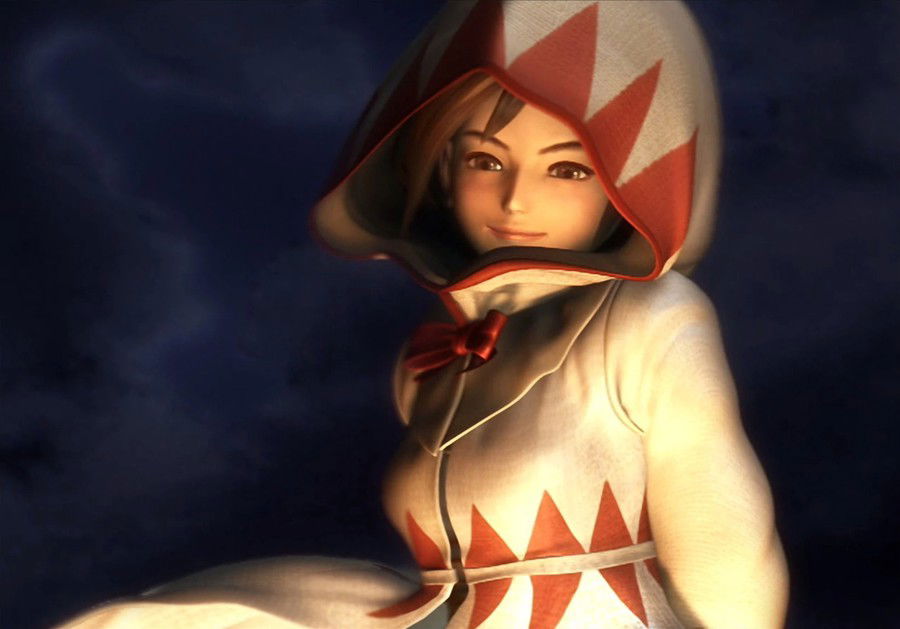
Speaking of Garnet, while Zidane is always ready to save her, she veers far from that stereotype as she slowly adapts to a world she didn't know outside of royalty, and accepts that reality isn't as simple as she would like it to be, especially when she realizes she doesn't have enough power to stop her mother.
During the plot, we see Garnet mature, evolve, learn to make her own decisions and assume her role as part of Alexandria royalty, only to then suffer irreparable losses and deal with a trauma that she eventually has to overcome, and the game makes her pain feel real to the player.
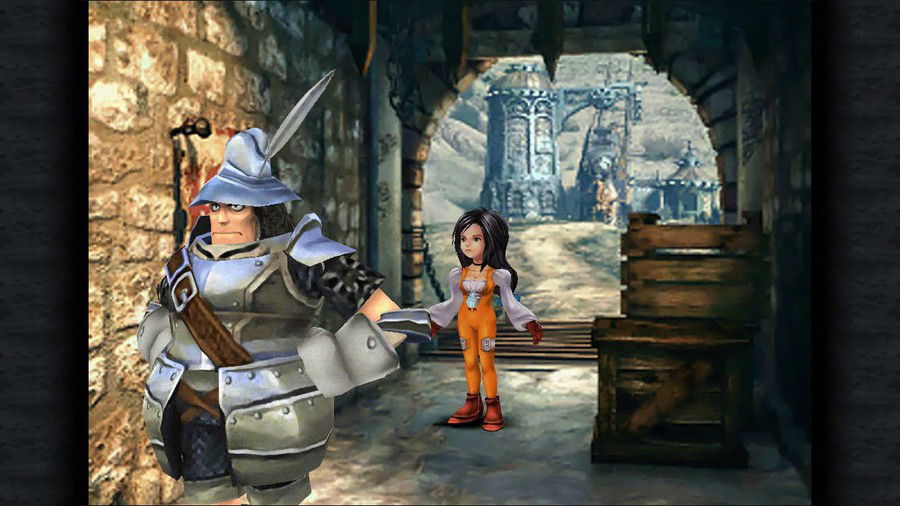
Garnet's story often intertwines with Steiner's, whose main theme is loyalty. He, on many occasions, actively acts against Zidane and the others because of his trust in his queen and little knowledge of what happens outside Alexandria, to the point of believing that anyone who says anything about the atrocities that the kingdom is committing is, naturally, a liar.
When finally faced with the truth, Steiner must decide where or to whom his allegiance belongs, and from that point forward he comes to see the value of his fellow men and what his duty to protect Garnet really means.
Who you should be against who you've become
Final Fantasy IX has as some of its main themes self-discovery and determinism. In other words, the idea that everything you are, think, feel, or do is preordained by your genetic characteristics, personal experience, teachings passed from generation to generation, among other influences that go beyond the "you" and "what would you do" to "what you were taught to do".
For example, we are all taught a dozen things as we grow up, like writing, reading, cooking, math, etc. — these traits are not naturally ours, they were taught by our kin, which were taught by their kin, and so on.
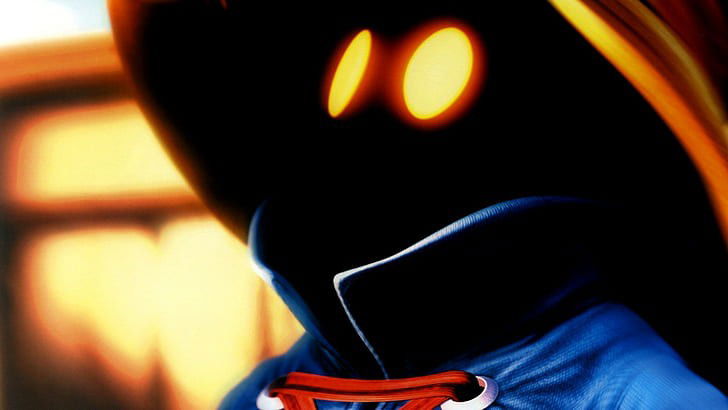
I believe that the character that best represents this aspect is Vivi. He is a Black Mage, and without the slightest idea of who he is and with a peculiar and unique appearance, his first contact with his origin is through the shocking experience of discovering that, although there are many Black Mages like him, they are nothing more than puppets created by processing the Mist to be used as weapons by Alexandria, leading him to question at several moments the purpose of his existence: if he was designed to be an instrument of war, and he definitely doesn't want to be a weapon, what should he be? What does he exist for, then?
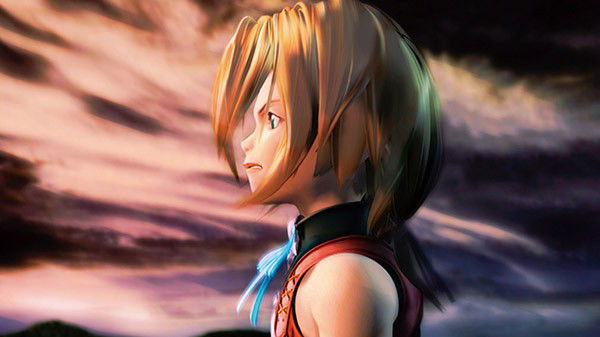
The other character facing a dilemma related to determinism is Zidane, who becomes the opposite of what he should be, making him one of the best lead characters in the series.
Zidane is charismatic and virtuous, lives by the motto that people don't need a reason to help each other, and demonstrates a degree of maturity and perhaps even a certain level of stoicism that we don't find easily in the real world, and that makes him admirable. He simplifies complicated topics and issues, has an absurd trust in his teammates, and at no time does he really take the role of "leader" to the point of removing the individuality or free will of any other team member - he simply trusts people, and actively trusts he should help them with their issues.
That doesn't mean he's completely good: Zidane has some malice and makes some decisions or does things that might be seen as morally questionable, but which in the end also add to his bon vivant personality, and some of the most powerful scenes in the game are precisely the ones in which he puts aside this optimistic tone to deal with his own conflicts.
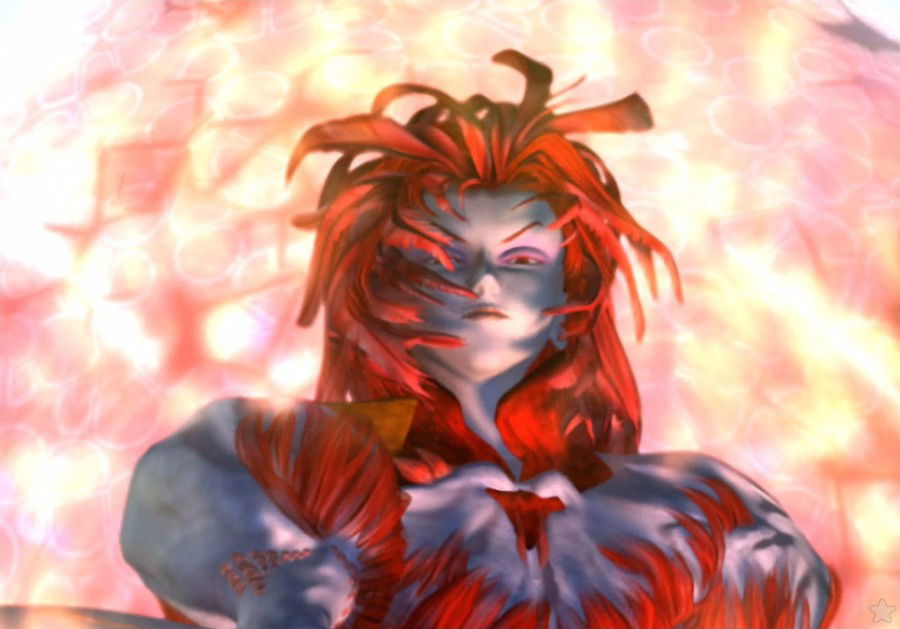
Kuja, the antagonist, is also another character in the plot who lives under the deterministic dilemma on his own terms. Although he doesn't have the depth and tragic backstory that we currently see on other villains, like Caius Ballad or Ardyn Izunia, Kuja is very well written, basically functioning as an antithesis to Zidane: he is narcissistic, has no appreciation for other people's lives, plans and operates his own plans alone and treats the rest as merely a means to his end, and with a very refined taste for art that visually exemplifies his twisted ego.
However, Kuja is also a victim of a fate he cannot control, and was raised to live and act that way, without the slightest opportunity to follow a distinct path given his lack of emotions. Zidane himself, at one point in history, comments that he would have probably done the same things and acted the same way in his place.
Does it make him a great antagonist? Not that much, but he does get way above some other mainline villains who are evil just for the sake of being evil, or whose backstory and motives aren't so well-elaborated.
A sublime soundtrack
At a time when voice acting in video games did not yet exist, the soundtrack works to dictate the ambiance and mood of each sequence, and the last soundtrack produced entirely by Nobuo Uematsu does it masterfully.
In just the first sequence of the game, the music changes so many times to give the player the appropriate feeling for that particular scene that it demonstrates an almost flawless artistic direction. The Evil Forest theme definitely fits the sense of delving into the depths of the unknown, while the world map theme portrays the concept of expanding your journey.
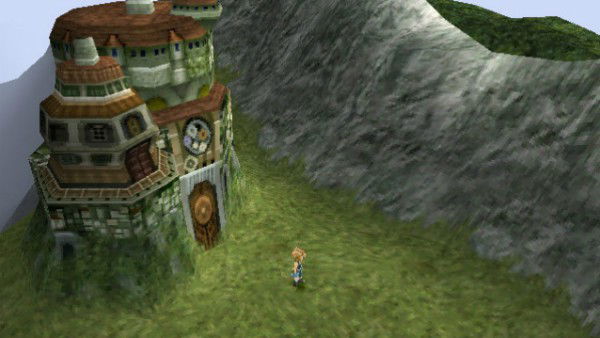
However, the real highlight at the beginning of the game is when you enter the village of Dali: after more than an hour of frantic action, it is the first time that the game presents you with an environment where the characters can rest, and the music represents the tranquility and calm of finally having a moment to breathe.
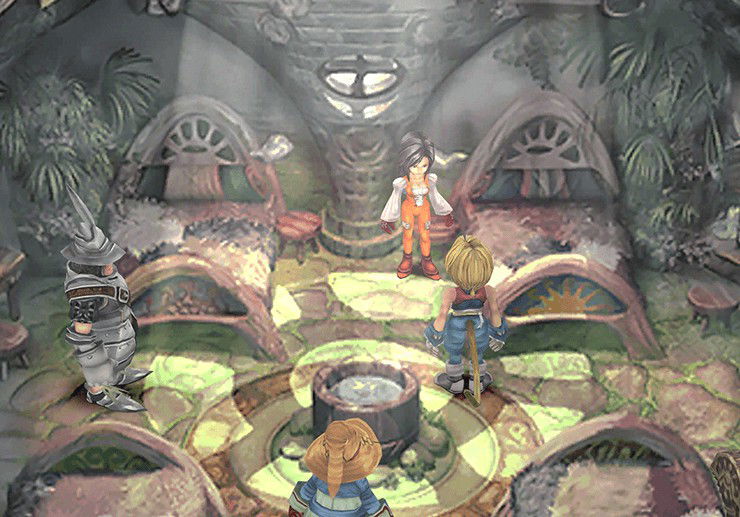
However, when Zidane and Garnet realize that Dali isn't just a village and head to the Black Mages factory underground, the game masterfully demonstrates how to change the setting by replacing the tranquility of the village with a track that not only has a tone of mystery, but it also makes you feel like you're diving deeper and deeper into a dark secret.
Final Fantasy IX has countless moments like this, the execution of the music is simply impeccable and at no time fails to transfer the feeling of a certain scene or sequence to the player, and attests to a strong point in Nobuo Uematsu's legacy for the franchise and for the music universe as a whole.
Conclusion
That's all for today.
Final Fantasy IX is definitely a title that has stood the test of time. it brings important reflections to the contemporary world while introducing a diverse and captivating group of characters in an incredibly detailed world through visual and sound environments that take the player to the deepest level of immersion that games of its time could provide.
But what makes it so important and still so powerful in the contemporary world is its story and the way in which it addresses existential issues, such as what it means to have a home, the importance of sharing moments with each other and, above all, what to do with the gift—or the curse—of life.
If you didn't know the franchise before, I wouldn't be able to recommend another title than this one because it captures absolutely everything that defines the Final Fantasy universe while standing the test of time well enough to be a fun experience.
There are numerous rumors of the arrival of an animated series of this game, or even the possibility of a remake in the near future. I would particularly love for any of these to happen because the title didn't get the recognition it deserved back then due to the weird release window it was initially placed in, and many people have yet to get to know its universe as they explore Gaia with Zidane and the others!
Thanks for reading!

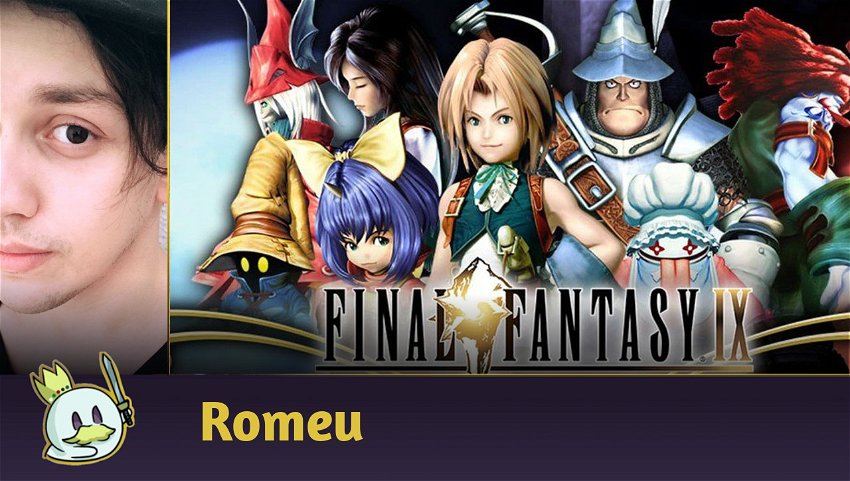





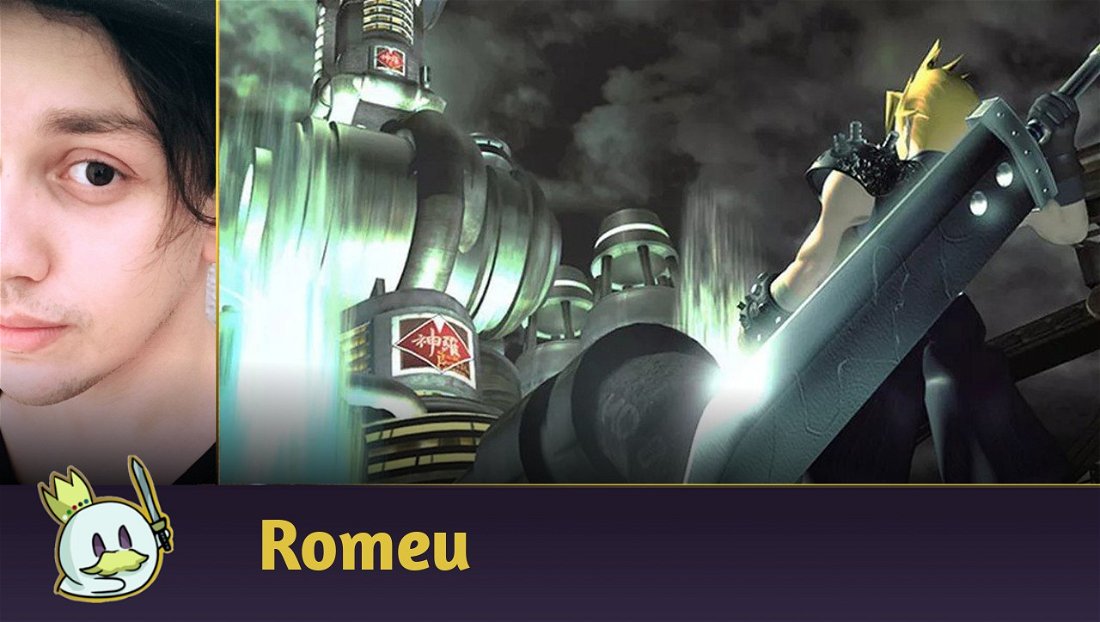



— Comments 0
, Reactions 1
Be the first to comment